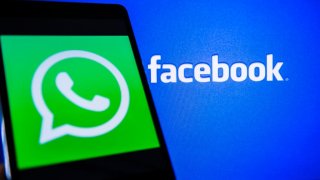
- Downloads of privacy-focused messaging apps Signal and Telegram got a boost as users looked for alternatives to Facebook-owned WhatsApp.
- The surge comes after WhatsApp updated its terms of service agreement that appears to give users little choice to opt out of sharing data with parent company Facebook.
- Signal claims to have "state-of-the-art end-to-end encryption" as part of its service, which prevents messages from being read by those who are not the intended recipient.
Downloads of privacy-focused messaging apps Signal and Telegram got a boost as users looked for alternatives to Facebook-owned WhatsApp over concerns about changes to the service's privacy policy.
Signal saw approximately 7.5 million installs globally through the Apple App Store and Google Play store between Jan. 6 and Jan. 10, according to Sensor Tower. That's 43 times the number from the previous week. It is highest week or even monthly install number for Signal in the app's history.
Meanwhile Telegram saw 5.6 million downloads globally from Wednesday through Sunday, according to Apptopia.
Signal claims to have "state-of-the-art end-to-end encryption" as part of its service, which prevents messages from being read by those who are not the intended recipient.
The surge in downloads of these two apps comes after WhatsApp released an update to its privacy policy on Jan. 4. Since 2016, WhatsApp has shared certain data with Facebook. But users previously had a chance to opt out of this.
But starting Feb. 8, users will be prompted in the app to accept the updated terms in order to continue using WhatsApp. Users in Europe and the U.K. will see a different message due to data protection rules in those jurisdictions.
WhatsApp messages are encrypted, however, meaning Facebook will not be able to see their contents. But WhatsApp collects a lot of other data which can be shared with its parent company.
This data includes account registration information such as your phone number, transaction data, service-related information, information on how you interact with others, including businesses when using the service, and mobile device information.
In a Monday statement, WhatsApp said this update does not affect the privacy of messages sent to friends and family. It clarified that the update will include "changes related to messaging a business on WhatsApp, which is optional, and provides further transparency about how we collect and use data."
WhatsApp says the data shared with Facebook is used to help improve infrastructure, promote safety and security and refine services by making suggestions or personalizing features and content. This could also include integration between Facebook-branded products and WhatsApp.
Money Report
After the announcement, Tesla CEO Elon Musk urged his Twitter followers last week to "use Signal."
Signal reported last week that verification codes sent to users via text message to start using the app were delayed because of high demand. Signal said it added additional servers in order to handle the influx of new users.
"We continue to shatter traffic records and add capacity as more and more people come to terms with how much they dislike Facebook's new terms," Signal said in a tweet. "If you weren't able to create a new group recently, please try again. New servers are ready to serve you."
Despite the surge in Signal and Telegram downloads, WhatsApp has not seen a decline, according to Adam Blacker, vice president of insights at Apptopia.
"It's too ingrained. My guess is there is a very small number of people who use WhatsApp daily that are recently deleting it," Blacker told CNBC by email.
"Even those who are downloading and using Signal or Telegram will continue to use WhatsApp as that is where most of their friends and family are. They may start to talk to certain people on Signal but still chat with their mom on WhatsApp."






